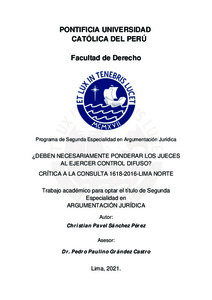| dc.contributor.advisor | Grández Castro, Pedro Paulino | |
| dc.contributor.author | Sánchez Pérez, Christian Pavel | |
| dc.date.accessioned | 2022-04-02T21:48:00Z | |
| dc.date.available | 2022-04-02T21:48:00Z | |
| dc.date.created | 2021 | |
| dc.date.issued | 2022-04-02 | |
| dc.identifier.uri | http://hdl.handle.net/20.500.12404/22061 | |
| dc.description.abstract | El presente trabajo pretende explicar a través del método dogmático si los jueces al ejercer
control difuso deben aplicar necesariamente el test de proporcionalidad conforme lo
ordenado en el precedente vinculante, Consulta Nro. 1618-2016-Lima Norte. Asimismo;
se explica la aplicación de la teoría conflictivista de derechos fundamentales y la
implicancia jurisprudencial en el control difuso para el Derecho peruano. Se arriba a la
conclusión de que, si bien el análisis de ponderación es un método de interpretación
constitucional global, este no es el único, debiendo priorizarse la libertad interpretativa y
no buscar obligar a los jueces a razonar de una única manera. Más aún si para ello no
existe justificación alguna y concurre un vacío jurisprudencial de motivación respecto de
que haya otro nivel de igual exigencia para la aprobación de la sentencia que realiza
control difuso. | es_ES |
| dc.description.abstract | The present research aims to explain, through the dogmatic method, whether judges, when
exercising diffuse control, must necessarily apply the proportionality test according to the
mandates of the binding precedent, query Nro. 1618-2016-Lima Norte. Also; the
application of the conflictivist theory of fundamental rights is explained, as well as the
jurisprudential implication in diffuse control for peruvian law.
It comes to the conclusion that, although weighting analysis is a constitutional global
interpretation method, this is not the only one, so interpretive freedom must be prioritized,
not forcing judges to reason in a single way. Even more, if there is no justification for this
and there is a case-law vacuum of motivation with respect to the existence of another
level of equal requirement for the approval of the statement that performs the diffuse
control. | es_ES |
| dc.language.iso | spa | es_ES |
| dc.publisher | Pontificia Universidad Católica del Perú | es_ES |
| dc.rights | info:eu-repo/semantics/openAccess | es_ES |
| dc.rights.uri | http://creativecommons.org/licenses/by/2.5/pe/ | * |
| dc.subject | Jueces--Perú | es_ES |
| dc.subject | Derechos fundamentales--Perú | es_ES |
| dc.subject | Perú--Legislación | es_ES |
| dc.title | ¿Deben necesariamente ponderar los jueces al ejercer control difuso? Crítica a la consulta 1618-2016-Lima Norte | es_ES |
| dc.type | info:eu-repo/semantics/bachelorThesis | es_ES |
| thesis.degree.name | Segunda Especialidad en Argumentación Jurídica | es_ES |
| thesis.degree.level | Título Profesional | es_ES |
| thesis.degree.grantor | Pontificia Universidad Catolica del Peru. Facultad de Derecho | es_ES |
| thesis.degree.discipline | Argumentación Jurídica | es_ES |
| renati.advisor.dni | 09461824 | |
| renati.advisor.orcid | https://orcid.org/0000-0001-7174-5534 | es_ES |
| renati.author.dni | 45257808 | |
| renati.discipline | 421029 | es_ES |
| renati.level | https://purl.org/pe-repo/renati/level#tituloSegundaEspecialidad | es_ES |
| renati.type | https://purl.org/pe-repo/renati/type#trabajoAcademico | es_ES |
| dc.publisher.country | PE | es_ES |
| dc.subject.ocde | https://purl.org/pe-repo/ocde/ford#5.05.01 | es_ES |






